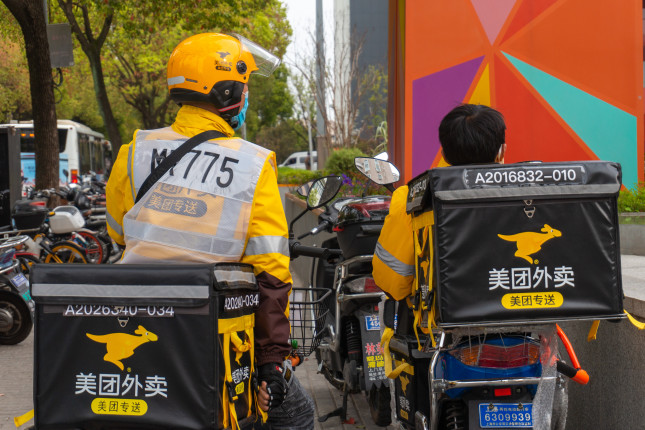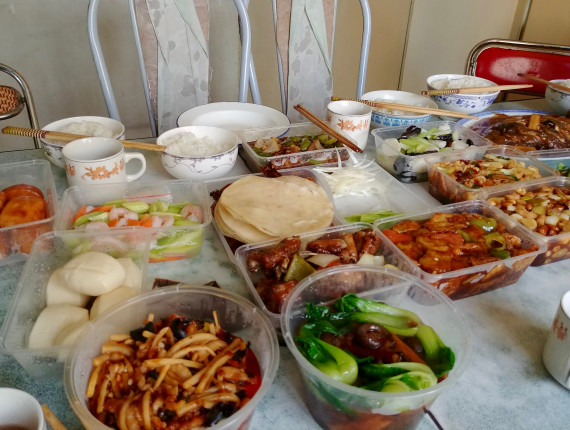In every Chinese city, there is an army of motorcycles and mopeds weaving through the traffic jams, and sometimes even venturing on sidewalks, to deliver millions of food and e-commerce orders each day. Meituan, one of China’s most popular food delivery apps, delivers
30 million orders a day, serving up 100 million plastic containers. According to Greenpeace, e-commerce and express delivery in China generated 9.4 million tons of packaging waste in 2018 and will likely triple to 41.3 million tons by 2025.
#1 in ocean plastic leakage
In 2019 alone the 63.25 billion e-commerce packages delivered a plastic waste punch of 280,000 tons, or the weight of about 23 school buses. While 40 percent of e-commerce paper packaging gets recycled in China, research led by Shenzhen University and the University of Michigan highlighted that minimal plastic packaging from e-commerce makes it to recycling plants. Much of this mismanaged waste flows into rivers and streams.
For example, each year, 1.5 million tons of plastic waste flows out of the Yangtze River, accounting for 55 percent of global river-to-ocean plastic leakage. One likely low estimate calculates that 100,000 tons of plastic waste flows through Guangdong’s Pearl River into the ocean annually. The unrelenting flow of plastic into rivers and oceans has sparked policy and NGO pressure in China to plug these leaks.
Plugging China’s single-use plastic leaks
The Chinese government began waste collection and sorting pilots in 2017. Three years later, the State Council issued national guidelines for e-commerce and food delivery to collect data on their waste volumes. Guangdong and Hainan provinces were the first to issue single-use plastic bans in 2020, and one year later, a national ban on bags and straws came into force.
Top-down action has been matched with growing grassroots activism around plastic. In 2018, Plastic Free China was established to focus solely on single-use plastic reduction through corporate campaigns to change business practices and consumer behavior. Plastic Free China has proposed policy changes on express delivery regulation, co-authored reports on e-commerce and food delivery waste with Greenpeace China, and worked with WWF China’s No Plastic in Nature Action Network.
The China Environment Forum sat down with CEO and co-founder Zheng Xue and project officer Sherry Lu to discuss how Plastic Free China is contributing to plastic reduction.
CEF: What are a few of Plastic Free China’s current campaigns?
Zheng: Last year, we published a report evaluating and ranking the package reduction efforts of express delivery companies so we can press them to reduce packaging. This year, we are educating consumers to identify whether the package they receive is over-packaged and engage them to put pressure on companies.
Sherry Lu: Our most recent success has been advancing the reduction of single-use plastics in express delivery. However, we are also trying to inform people about problems related to biodegradable plastic and airline plastics. Airlines use light-weight plastic to reduce their fuel consumption, so it is hard to make the company change their use, but we are promoting public education campaigns to urge travelers to avoid using plastics on planes.
CEF: What do your consumer awareness campaigns look like?
Zheng: We are planning online public awareness campaigns to educate consumers on the severity of the single-use cutlery and take-out food packaging problem. From a report by Meituan and the China Restaurant Association, we noticed that half of the take-out orders originate in the home or residential places, followed by office buildings, schools, and hotels. We believe it is reasonable that a large percentage of consumers could alternatively use reusable cutlery. Another issue we saw come up this year was that although China banned single-use plastic straws, so now many restaurants offer paper straws, the ban backfired because a paper straw is not strong enough to pierce the beverage cover. Restaurants and coffee shops were offering single-use plastic sticks to pierce the cover so that the paper straw could go into the cup. It was ridiculous and frustrating! We are reviewing the impact of such alternatives and are engaging the public on Weibo, WeChat, and other social media platforms to discuss and educate about plastic waste issues.
CEF: Is Plastic Free China evaluating plastic containers in terms of the actual materials or recyclability? Is it hard to get these food containers recycled?
Zheng: The plastic container problem is difficult to solve in a short period of time. Our objective is to promote reusable containers. Encouragingly, there are already some reusable container models in our region that other companies could emulate. For example, the Shenzhen Shuangti company uses reusable containers to deliver take-out food on university campuses.
From the perspective of single-use container materials, it is difficult to tell which one is good or bad. The Chinese government has said that by 2025, at least 30 percent of single-use plastic containers should be biodegradable plastics. The goal is impressive but, eventually, there is no difference because biodegradable plastics will likely go to the incinerator or a landfill. Moreover, paper materials are not feasible for all take-out orders, like soups. Data reveals that about 80 percent of the container material now is plastic because that is the most effective choice for companies and consumers.
CEF: What does Plastic Free China’s connection with local government look like?
Zheng: We try hard to build relationships with relevant government departments, especially those that oversee the express delivery packaging problem, by joining their workshops and meetings. In our report, we got great input from government officers who also care about solving express delivery packaging problems. We are also creating forums with NGOs, academic institutions, and businesses to come together and share their experiences on how to solve the plastic problem.
Sherry Lu: Last year, we wrote a paper to the government after they solicited public opinion on their new green express delivery regulations, and I was happy because they took our advice and improved some green express delivery regulations.
CEF: Could you name a person who has inspired you?
Zheng: I think Mao Da, head of China’s Zero Waste Alliance, is one of them. I have been working with him since 2016 on various plastic campaigns. He has a very strong understanding of how NGOs should work. From him, I learned how NGOs can play a vital role in connecting stakeholders that are doing similar work. Because Chinese NGOs are usually so tiny, it is critical to connect and cooperate to make our campaigns powerful.
Sherry: Friends of Nature has inspired me because they are successful in policy advocacy, and they have filed many successful lawsuits to halt polluting industries and biodiversity loss. All the old manuals for policy advocacy in China were written by them and they have really encouraged me in my work.
Solange Reppas was a research assistant at China Environment Forum during summer 2021. She is pursuing a BA in Public Policy and East Asian Languages and Civilizations at the University of Chicago.
Mingwei Zhu was a summer 2021 research assistant at the China Environment Forum. He researched how grassroots NGOs in Asia are working to address plastic waste and other environmental challenges.
Tongxin Zhu is an assistant analyst at the Innovative Green Development Program in Beijing, where she supports research related to carbon, energy, and climate change in provinces and cities in China. She was a 2020-21 research assistant at the China Environment Forum.
McKenna Potter is a research assistant at the China Environment Forum. She is an undergraduate Global Business and International Political Economics double major at UT Dallas and Bill Archer Fellow focusing on international business sustainability development.
Lead Photo Credit: Meituan Waimai delivery men navigating Shanghai Traffic, courtesy of Andy Feng/Shutterstock.com.
Sources: CENews, CKGSB, CGTN, China News, Elsevier, Friends of Nature, Green Peace, National Development and Reform Commission of China, Plastic Free China, Sea Circular, State Post Bureau of the People’s Republic of China, Toxics-Free Corps, Verdict, Washington Post.
 A Publication of the Stimson Center.
A Publication of the Stimson Center.









